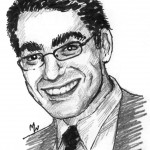For the Jews: Is worship of Jesus a violation of the Second Commandment “Thou shalt have no gods in addition to me”? For the Christians: Is the ancient covenant between God and Israel irrelevant, replaced by a universal need for faith in Christ? For both: who gets to Heaven?
 Most people of faith don’t confront these sorts of questions regularly. Certainly, most religious Christians and Jews don’t explore them intensely together. But over the course of a remarkable interfaith spring break trip through Israel, that is precisely what I did.
Most people of faith don’t confront these sorts of questions regularly. Certainly, most religious Christians and Jews don’t explore them intensely together. But over the course of a remarkable interfaith spring break trip through Israel, that is precisely what I did.
Attempts at interfaith engagement can be profoundly frustrating. In too many settings, interfaith dialogue is driven by those with limited knowledge and commitment and devolves into mushy rounds of “I don’t believe anything, you don’t believe anything. Wow, we’re so similar!” Even among those with more serious commitment to traditions and dogma, dialogue is merely a reduction to lowest common denominator values: “I believe in the Golden Rule, you believe in the Golden Rule, let’s go do social justice!”
These sorts of interactions (and certainly the latter) no doubt have their place. But many of us came to Yale to engage substantively with those who possess radically different world-views. Indeed, a central goal of the admissions process is (or at least should be) the production of a class whose members have a variety of substantive experiences and deeply held values. Nevertheless, all too often it seems that Yale is more melting pot than tossed salad; values soften, orthodoxies crumble and a gray sameness takes hold.
As you move through your four years here, Yale becomes a decreasingly diverse place. We have races and accents galore, but a laissez-faire live-and-let-live attitude steadily overwhelms robust value systems. In the place of a meaningful diversity of beliefs, we are left with an empty pluralism of desires and interests. The latter is a poor substitute for the former. It is from the sharp clash and sustained engagement between deeply held orthodoxies that meaningful education occurs.
It was this realization that led a group of Orthodox Jewish students and Christians from Yale Students for Christ to begin meeting weekly two years ago, to study the Bible together at the Slifka Center. Together, we delve deeper into texts that we both view as divine Word. In the contrast and dialogue between two firm traditions, we have grown in our understanding of God, ourselves and one another.
This year, with the assistance of generous donors, we were able to take our study to an entirely different level: a joint spring break in Israel. So we walked together, Bibles in hand, through the hills of Judea, the towns of the Galilee and along the excavated streets of ancient Jerusalem. We hiked the paths of the patriarchs, visited the tombs of Jewish sages and followed in the footsteps of Jesus.
In the process, our conversations took on new dimensions. As we circled the sites of the Jesus’ miracle-working, the Jews in the group had to directly confront the question: how do we view the historical figure of Jesus? Was he a liar, lunatic, prophet or sage? As our friends prayed in Jesus’ name and took communion, we admired the spontaneity of their prayer. But we also wrestled with whether their veneration of a human being constituted idolatry.
Similarly, my Christian friends wrestled with the theological implications of a thriving, faithful Judaism that complicates the narrative of a people whose time is past and whose salvation depends on conversion to Christian faith. Especially in the modern state of Israel, it is impossible to escape the vivid reality of a Jewish nation reborn. In the streets of Jerusalem, the prophecies of redemption take on new meaning. So what is the place of the Jewish people in God’s plan?
At the same time, the modern state of Israel is secular, governed by a democracy that views the Bible as cultural heritage rather than a theological blueprint. And though Israel is once again a free people in its ancestral home, the Waqf’s ban on Jewish prayer on the Temple Mount remains in full force. How must both of our theologies adapt to that incongruity?
Are our theologies in any way reconcilable? If not, might it ever be possible to view one another as full partners in a covenantal mission to bring about messianic redemption? Our marathon conversations settled none of these questions, but the experience was mind-blowing.
We ended the trip emotionally and intellectually exhausted, but invigorated by the land, the Bible and by one another. As I prepare to leave Yale, I can only beg readers to embrace their own orthodoxies, and seek out those who hold robust alternatives. It is from these interactions that the brightest sparks will fly.
Yishai Schwartz is a senior in Branford College. Contact him at yishai.schwartz@yale.edu .







